It looks like you're using an Ad Blocker.
Please white-list or disable AboveTopSecret.com in your ad-blocking tool.
Thank you.
Some features of ATS will be disabled while you continue to use an ad-blocker.
share:
Spirituality and the Way of the Warrior
War is an ugly, bloody business, and make no mistake about it. And yet as near as one can say about such things, it appears to be a universal human practice, in all times and places.
Humans since the dawn of time have struggled to integrate the seeming inevitability of war with their various spiritualties, moralities, and religions. Thus in many times and places a kind of mystical fusion has arisen, in which the practice of warfare is used as a metaphor or an actual template for spiritual practice.
Like a spiritual path, a warrior’s road demands honor, dignity, discipline. The mastery of skills. The weighing of life and death. The adoption of a razor-sharp ethical code in situations where ethics seem muddy at best.
The examples are endless, really….
….the austere Zen path of Bushido among the samurai, and the all-or-nothing emptiness of their modern-day counterparts, the kamikaze…

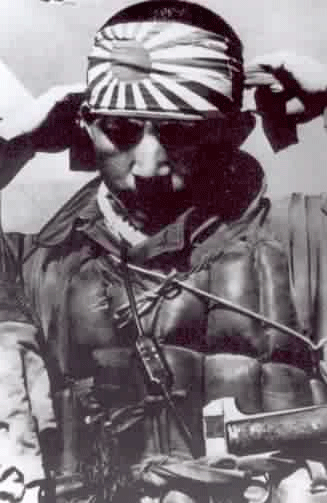
…The Hindu Mahabharata, which uses the battle-time thoughts of Arjuna and Krishna to teach profound truths…
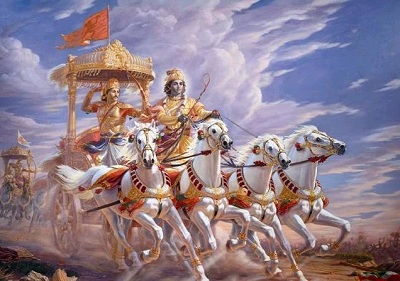
….the medieval European code of chivalry, with its shining nights and ideals of mystically sanctioned nobility and basis for the later Western ideal of “the Gentleman”…
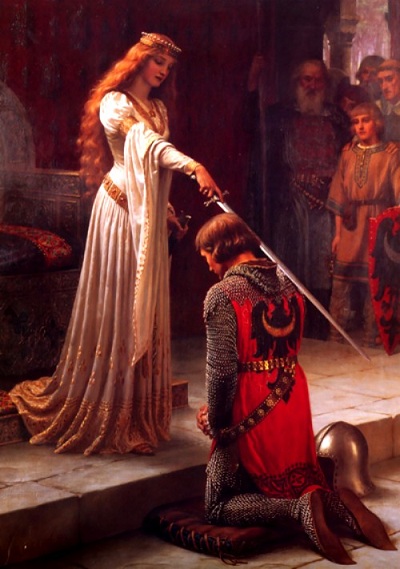
….the Native American Brave, acting in harmony with the Spirit World through the practice of his craft of skill and danger….
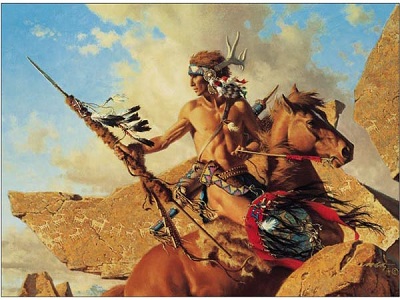
….The Tibetan notion of the Warrior of Shamabala, whereby the military legends of this mythical kingdom become a metaphor for righteous enlightened living…
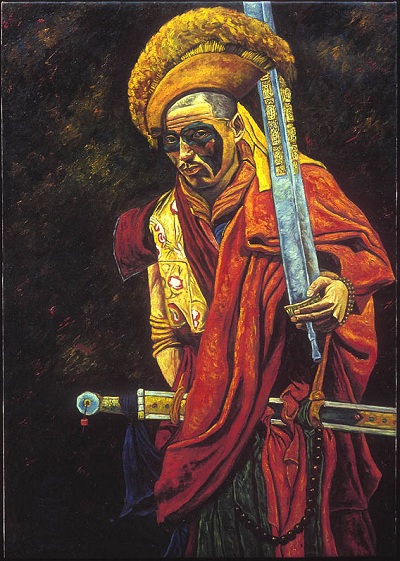
…even in our own era, many subscribe to the austere military idea of a perfect warrior as spiritual man following a code of honor, and all that it entails….

The question becomes: Is the fusion of spirituality and warfare valid, or merely a way of glorifying and living with something far uglier and brutal? Is it a path to spiritual growth, or a perversion of spirituality’s most sacred core valuses of compassion and mercy?
To pick but one of many examples, the Zen detachment of a Bushido practitioner sounds beautiful on paper, but the Rape of Nnking was one of humanity’s greatest tragedies, and Japan’s medieval samurai wars were exercise in mass slaughter, bringing pain to millions. Of course other examples abound.
I have no answer for you, ATS. I want to hear your opinions. Any issues touching on this subject are open for discussion in this thread.
War is an ugly, bloody business, and make no mistake about it. And yet as near as one can say about such things, it appears to be a universal human practice, in all times and places.
Humans since the dawn of time have struggled to integrate the seeming inevitability of war with their various spiritualties, moralities, and religions. Thus in many times and places a kind of mystical fusion has arisen, in which the practice of warfare is used as a metaphor or an actual template for spiritual practice.
Like a spiritual path, a warrior’s road demands honor, dignity, discipline. The mastery of skills. The weighing of life and death. The adoption of a razor-sharp ethical code in situations where ethics seem muddy at best.
The examples are endless, really….
….the austere Zen path of Bushido among the samurai, and the all-or-nothing emptiness of their modern-day counterparts, the kamikaze…


…The Hindu Mahabharata, which uses the battle-time thoughts of Arjuna and Krishna to teach profound truths…

….the medieval European code of chivalry, with its shining nights and ideals of mystically sanctioned nobility and basis for the later Western ideal of “the Gentleman”…

….the Native American Brave, acting in harmony with the Spirit World through the practice of his craft of skill and danger….

….The Tibetan notion of the Warrior of Shamabala, whereby the military legends of this mythical kingdom become a metaphor for righteous enlightened living…

…even in our own era, many subscribe to the austere military idea of a perfect warrior as spiritual man following a code of honor, and all that it entails….

The question becomes: Is the fusion of spirituality and warfare valid, or merely a way of glorifying and living with something far uglier and brutal? Is it a path to spiritual growth, or a perversion of spirituality’s most sacred core valuses of compassion and mercy?
To pick but one of many examples, the Zen detachment of a Bushido practitioner sounds beautiful on paper, but the Rape of Nnking was one of humanity’s greatest tragedies, and Japan’s medieval samurai wars were exercise in mass slaughter, bringing pain to millions. Of course other examples abound.
I have no answer for you, ATS. I want to hear your opinions. Any issues touching on this subject are open for discussion in this thread.
It avails neither the cause, nor the 'path', to blindly assume that there is no adversary...
A warrior need not 'fight' or 'battle'...but more often than not, the battle takes place in the warriors mind...given this, others will have this skirmish within themselves...and how this reveals itself outwardly, presents the dynamics of adversarial movements...we place ourselves into position, while holding the 'principles' of honour...the positioning is part of this 'battle'...and aids in shoring or shaking principles...and within the mind of the warrior is the 'battle' won or lost...
Alove
A warrior need not 'fight' or 'battle'...but more often than not, the battle takes place in the warriors mind...given this, others will have this skirmish within themselves...and how this reveals itself outwardly, presents the dynamics of adversarial movements...we place ourselves into position, while holding the 'principles' of honour...the positioning is part of this 'battle'...and aids in shoring or shaking principles...and within the mind of the warrior is the 'battle' won or lost...
Alove
War is just a valid excuse to steal wealth and resources.
Thout shalt not kill.
Everyone with blood on their hands, goes to hell. Everyone. Unless of course they seek forgivness before the day they die.
Only YHWH can take back what He created. No mortal has the right to take a life.
Thout shalt not kill.
Everyone with blood on their hands, goes to hell. Everyone. Unless of course they seek forgivness before the day they die.
Only YHWH can take back what He created. No mortal has the right to take a life.
reply to post by FailedProphet
I have relished many thoughts on the subject..to my conclusion,religion and mad politics must be deleted from the equation ...........
I have relished many thoughts on the subject..to my conclusion,religion and mad politics must be deleted from the equation ...........
I don't think it is possible to find a meaning and lasting spiritual countenance without approaching the living of your life as a warrior, it is
imperitive a warrior remains centered in all situations.
Also without the situations arising in which you can test your mettle, how do you know if the warrior is ever within you.
Living your life as a warrior is the path to perfection, but, i don't think this means you have to be violent, the greatest warriors can bend the will of themselves and others without resorting to violence.
I recommend "The art of dreaming" and"Tales of power" by Carlos casteneda, the strongest of men first master their dreams.
It becomes a spiritual perversion when the unwritten but nonetheless meaningful knowledge of not harming things or people just because you can is ignored, every time you do something that is against "Life" it taints your soul, on a very deep fundamental level we all understand that some things are wrong. The unnecessary taking of life, any Life is wrong and on a deeply intuitive level we all know that, Having the ability to take life and not using it is the true test of a warrior, everything else is beneath comtempt and has a long way spiritually to evolve.
As you post very eloquently points out, their are many "Warrior Traditions" that aspire to higher ideological ideals, Many of them though are perversions, they utilise the warrior tradition to coerce "righteous violence" in defence of faith. this is an oxymoron, true spirituality involves only your warrior mindset and how it applies to your life, it is not something to be applied under the control of another person.
To live life as a warrior, first call no man as "Master" of your own soul, How can you be a warrior if someone else is giving you orders?.
For me this is the perversion, people willingly subjugating themselves into subserviance, this is why i like buddhism so much, all the answers ARE within you, Live life like a warrior, remain centered at all times, fear nothing.
Also without the situations arising in which you can test your mettle, how do you know if the warrior is ever within you.
Living your life as a warrior is the path to perfection, but, i don't think this means you have to be violent, the greatest warriors can bend the will of themselves and others without resorting to violence.
I recommend "The art of dreaming" and"Tales of power" by Carlos casteneda, the strongest of men first master their dreams.
It becomes a spiritual perversion when the unwritten but nonetheless meaningful knowledge of not harming things or people just because you can is ignored, every time you do something that is against "Life" it taints your soul, on a very deep fundamental level we all understand that some things are wrong. The unnecessary taking of life, any Life is wrong and on a deeply intuitive level we all know that, Having the ability to take life and not using it is the true test of a warrior, everything else is beneath comtempt and has a long way spiritually to evolve.
As you post very eloquently points out, their are many "Warrior Traditions" that aspire to higher ideological ideals, Many of them though are perversions, they utilise the warrior tradition to coerce "righteous violence" in defence of faith. this is an oxymoron, true spirituality involves only your warrior mindset and how it applies to your life, it is not something to be applied under the control of another person.
To live life as a warrior, first call no man as "Master" of your own soul, How can you be a warrior if someone else is giving you orders?.
For me this is the perversion, people willingly subjugating themselves into subserviance, this is why i like buddhism so much, all the answers ARE within you, Live life like a warrior, remain centered at all times, fear nothing.
reply to post by Rapha
No they don't, you have a myth hang up here, If the Bible was true, then all those christian warriors that went to the crusades would be in hell, they asked for forgiveness, then went on to kill in YHWH name, how utterly retarded.
Or is it okay to kill because YHWH's man on earth said it is what YHWH wanted?.
Everything is so black and white in your world, good vs evil, in my world everything is white, and getting whiter, brighter by the second, heres a newsflash, EVERYONE! gets re-incarnated, you will keep coming here until you can live your life like a true warrior and find the truth. it isn't black and white.
No they don't, you have a myth hang up here, If the Bible was true, then all those christian warriors that went to the crusades would be in hell, they asked for forgiveness, then went on to kill in YHWH name, how utterly retarded.
Or is it okay to kill because YHWH's man on earth said it is what YHWH wanted?.
Everything is so black and white in your world, good vs evil, in my world everything is white, and getting whiter, brighter by the second, heres a newsflash, EVERYONE! gets re-incarnated, you will keep coming here until you can live your life like a true warrior and find the truth. it isn't black and white.
Originally posted by Rapha
War is just a valid excuse to steal wealth and resources.
Thout shalt not kill.
Everyone with blood on their hands, goes to hell. Everyone.
No mortal has the right to take a life.
I agree with your first statement.
However if my family and I are about to become victims of looting marauders carrying out your first statement, stealing yours and your families resources and killing everyone in the process then perhaps I will be shooting to kill instead of wound.
Those who kill arbitrarily and have such little regard for the value and sanctity of a human life seem truly at odds with the harmony of the universe, allowing them to prosper and continue on may in fact make you a bigger accomplice to murder through non-action. Its a difficult question on morality, feeling that strongly on "rights" and the "taking" of a life. I wonder how Christ would have answered.
When you say take a life do you mean anything that has a pulse or just human life? Buddhist's say anything that you knew you were killing human or otherwise. This way they can get around killing moths and insects with their cars or under hoofs or horses etc. It wasn't their intention to kill those insects and moths.
reply to post by FailedProphet
It's certainly not spiritual perfection.
Id say the ideology was begotten by the mind as a coping mechanism, but has indeed been used as a perversion.
It's certainly not spiritual perfection.
Id say the ideology was begotten by the mind as a coping mechanism, but has indeed been used as a perversion.
one of the best books ive read is "The way of the peaceful warrior" by dan millman i think ....
reply to post by sparrowstail
There are some aspects of buddhism i don't like, the way they can leave a newborn to die, saying it is the life the child earned, and that they will be reborn and no harm has taken place, using this as a reason to justify the childs death is painfull, especially to my soft western mind.
There are some aspects of buddhism i don't like, the way they can leave a newborn to die, saying it is the life the child earned, and that they will be reborn and no harm has taken place, using this as a reason to justify the childs death is painfull, especially to my soft western mind.
Originally posted by The X
reply to post by sparrowstail
There are some aspects of buddhism i don't like, the way they can leave a newborn to die, saying it is the life the child earned, and that they will be reborn and no harm has taken place, using this as a reason to justify the childs death is painfull, especially to my soft western mind.
Please direct me to a link where it says Buddhists leave babies to die.
Yes, way of the peaceful warrior!!!
I LOVE this book. Anything Dam Millan writes is pretty good.
I found this book one day on the bus. Most people I have talked to about it say they found it too. If you can spare a copy, throw it into circulation. Leave it on a bench, in a coffee shop, whatever. It is a fortuitous surprise for anyone.
another philosophy to consider that is in line with this way of life is the way of the gentleman. This concept has been expanded on enough for everyone to be able to incorporate it into their lives.
www.cyberpathway.com...
cnx.org...
"Kishido: The Way of the Western Warrior" by Peter Hobart.
What an excellent read that was!
I LOVE this book. Anything Dam Millan writes is pretty good.
I found this book one day on the bus. Most people I have talked to about it say they found it too. If you can spare a copy, throw it into circulation. Leave it on a bench, in a coffee shop, whatever. It is a fortuitous surprise for anyone.
another philosophy to consider that is in line with this way of life is the way of the gentleman. This concept has been expanded on enough for everyone to be able to incorporate it into their lives.
In order to be a gentleman, you must completely wash your mind of anything that has to do with yourself."
A BOOK OF FIVE RINGS
by Miyamoto Musashi
There are four Ways in which men pass through life: as gentlemen, farmers, artisans and merchants.
The Way of the farmer. Using agricultural instruments, he sees springs through to autumns with an eye on the changes of season.
Second is the Way of the merchant. The wine maker obtains his ingredients and puts them to use to make his living. The Way of the merchant is always to live by taking profit. This is the Way of the merchant.
Thirdly the gentleman warrior, carrying the weaponry of his Way. The Way of the warrior is to master the virtue of his weapons. If a gentleman dislikes strategy he will not appreciate the benefit of weaponry, so must he not have a little taste for this?
Fourthly the Way of the artisan. The Way of the carpenter [architect and builder, all buildings were of wood. - Slaegr] is to become proficient in the use of his tools, first to lay his plans with a true measure and then perform his work according to plan. Thus he passes through life. These are the four Ways of the gentleman, the farmer, the artisan and the merchant.
The Way of Strategy
In China and Japan practitioners of the Way have been known as "masters of strategy". Warriors must learn this Way.
Recently there have been people getting on in the world as strategists, but they are usually just sword-fencers. The attendants of the Kashima Kantori shrines of the province Hitachi received instruction from the gods, and made schools based on this teaching, travelling from country to country instructing men. This is the recent meaning of strategy.
In olden times strategy was listed among the Ten Abilities and Seven Arts as a beneficial practice. It was certainly an art but as a beneficial practice it was not limited to sword-fencing. The true value of sword-fencing cannot be seen within the confines of sword-fencing technique.
If we look at the world we see arts for sale. Men use equipment to sell their own selves. As if with the nut and the flower, the nut has become less than th flower. In this kind of Way of strategy, both those teaching and those learning the way are concerned with colouring and showing off their technique, trying to hasten the bloom of the flower. They speak of "This Dojo" and "That Dojo". They are looking for profit. Someone once said "Immature strategy is the cause of grief". That was a true saying.
There are four Ways in which men pass through life: as gentlemen, farmers, artisans and merchants.
The Way of the farmer. Using agricultural instruments, he sees springs through to autumns with an eye on the changes of season.
Second is the Way of the merchant. The wine maker obtains his ingredients and puts them to use to make his living. The Way of the merchant is always to live by taking profit. This is the Way of the merchant.
Thirdly the gentleman warrior, carrying the weaponry of his Way. The Way of the warrior is to master the virtue of his weapons. If a gentleman dislikes strategy he will not appreciate the benefit of weaponry, so must he not have a little taste for this?
Fourthly the Way of the artisan. The Way of the carpenter [architect and builder, all buildings were of wood. - Slaegr] is to become proficient in the use of his tools, first to lay his plans with a true measure and then perform his work according to plan. Thus he passes through life. These are the four Ways of the gentleman, the farmer, the artisan and the merchant.
www.cyberpathway.com...
Confucianism: The Way of the Gentleman
This great ethical and philosophical system is named after its founder, K'ung Fu‑tzu (or Master K'ung), an ethical philosopher of the late sixth and early fifth centuries B.C.E. whose Chinese name was later latinized to Confucius by Jesuit missionaries.
It is debatable whether the system he founded should be called a religion. While it prescribes a great deal of ritual, little of it could be construed as worship or meditation in a formal sense ‑ this function was fulfilled by the ". . . practitioners of the ancient magico‑religious system, exorcists and shaman‑diviners . . . " (Smith 1973:111) or, as Blofeld (1979:90) calls it, ". . . the ancient folk religion that never achieved a name of its own”.
Chün‑tzu‑ the gentleman. The gentleman is the ideal towards which all Confucians strive (in modern times, the masculine bias in Confucianism has weakened, but the same term is still used). The term literally means "son of a ruler", and there was a class‑based elitism inherent in the gentleman concept, but besides this, gentlemen were also expected to act as moral guides to the rest of society.
Gentlemen are those who cultivate themselves morally, who participate in the correct performance of the rites, who show filial piety and loyalty where these are due and who have cultivated humaneness. The great exemplar of the gentleman is Confucius himself.
It is indeed one of the great tragedies of his life that he was never awarded the high official position which he desired all his life, and from which he wished to demonstrate the general well‑being that would ensue if humane persons ruled and administered the state.
cnx.org...
"Kishido: The Way of the Western Warrior" by Peter Hobart.
What an excellent read that was!
The code of the samurai and the path of the knight-warrior--traditions from opposite sides of the globe--find a common ground in Kishido: the Way of the Western Warrior. In fifty short essays, Peter Hobart presents the wisdom, philosophy and teachings of the mysterious Master who first united the noble houses of East and West.
Kishido prioritizes the ideals of duty, ethics, courtesy and chivalry, from whatever source they derive. This cross-cultural approach represents a return to time-honored principles from many traditions, and allows the modern reader from virtually any background to find the master within.
Kishido
Kishido - The Way of the Western Warrior by Peter Hobart published by Hohm Press under the heading of Martial Arts/Inspiration. A term that has its first part taken from the kanji dictionary "kishi", meaning an English knight, and the second part "do", meaning The Way (or The Path).
The content is amazingly insightful! It is also a first to compare what the Japanese Bushido code and the English Chivalric code share.
Part 1.
Chapter 2 - The Chivalric Code of Charlemagne
To serve God and defend the Church
To serve the liege lord in valour and faith
To protect the weak and the defenceless
To give succour to widows and orphans
To refrain from the wanton giving of offence
To live by honour and for glory
To despise pecuniary reward
To fight for the welfare of all
To obey those justly in authority
To guard the honour of fellow knights
To eschew unfairness, meanness and deceit
To keep faith
At all times to speak the truth
To persevere to the end any enterprise begun
To respect the honor of women
Never to refuse a challenge from an equal
Never turn the back upon a foe
edit on 13-5-2012 by BIHOTZ because: (no reason given)
reply to post by sparrowstail
Murder requires intention, without intent it becomes an accidental killing. There is a difference, but this is not to say that accidental killing is justified. Usually a person's actions can be blamed. Take a drunk driver, for example, who crashes into another car or runs over a pedestrian; the driver is to blame because he/she made a really stupid choice. There can be cases where a person is not doing anything out of the ordinary or intentionally putting other lives in harm's way and s*** happens; such is life.
I think that, in general, as long as a person does not go out of his or her way to kill, he/she is in good moral standing.
We could probably argue that self defense is a part of war, and I don't know how I feel about self defense being murder. It's true that if you don't kill your enemy in a warzone, he/she will likely kill you.
For the sake of this thread, however, we can hopefully agree that a warrior fights with the intent to kill, and thus deaths caused by his or her hand are to be considered murder.
The easiest solution is to avoid war when possible. Even if the price is jail for being a draft dodger, I'd take a few years of prison over a lifetime of PTSD and blood on my hands. There is seldom honor in war, especially if it's for this tragic nation.
As higher life, it is our responsibility to have mercy on, and care for, lower life. Killing animals and insects intentionally is, in my eyes, often worse than killing another human being. Life is life, and it should be revered.
Murder requires intention, without intent it becomes an accidental killing. There is a difference, but this is not to say that accidental killing is justified. Usually a person's actions can be blamed. Take a drunk driver, for example, who crashes into another car or runs over a pedestrian; the driver is to blame because he/she made a really stupid choice. There can be cases where a person is not doing anything out of the ordinary or intentionally putting other lives in harm's way and s*** happens; such is life.
I think that, in general, as long as a person does not go out of his or her way to kill, he/she is in good moral standing.
We could probably argue that self defense is a part of war, and I don't know how I feel about self defense being murder. It's true that if you don't kill your enemy in a warzone, he/she will likely kill you.
For the sake of this thread, however, we can hopefully agree that a warrior fights with the intent to kill, and thus deaths caused by his or her hand are to be considered murder.
The easiest solution is to avoid war when possible. Even if the price is jail for being a draft dodger, I'd take a few years of prison over a lifetime of PTSD and blood on my hands. There is seldom honor in war, especially if it's for this tragic nation.
As higher life, it is our responsibility to have mercy on, and care for, lower life. Killing animals and insects intentionally is, in my eyes, often worse than killing another human being. Life is life, and it should be revered.
What I resonated with the most out of Kishido....
www.thoughts.com...
My thread on Christian Bushido
Chapter 4
A Pure Heart - It is said that the Master does not look primarily for wisdom, righteousness or good judgement in his students - he looked for a pure heart. The rest, he said, would follow as a matter of course.
It must be sensed as one recognizes the presence of a kindred spirit. How many times does a person observe some social nicety - prehaps the holding of a door - only to have the other plow past it, oblivious to its very existence?
Then there are those who simply accept such noble tendencies in others without any thought of reciprocity, seeing them as a convenient peculiarty. These people are to be avoided, for they are the parasites that drain the lifeblood from the modus vivendi (agree to disagree) and a code of conduct already on the brink of extinction.
Purity of heart is a hard way. It promises no pay-off. It is not lucrative, glamorous or often enjoyable. It can drain rather than supplement one's resources. It is likely to make the adherent less popular, at least with the majority, not more. But once in a very great while there will come a fellow traveler and an enduring bond will form. An instantaneous understanding will take hold. And a kinship that can rarely be broken will quicken. The Master was such a one.
www.thoughts.com...
My thread on Christian Bushido
edit on 13-5-2012 by BIHOTZ because: (no reason
given)
one more thing you guys should be digesting if this is the path you find yourself on.
www.thoughts.com...
The Warrior Creed
The Warrior Creed
By Robert L. Humphrey
(Iwo Jima Marine)
--------------------------------------------------------------------------------
Wherever I go,
everyone is a little bit safer because I am there.
Wherever I am,
anyone in need has a friend.
Whenever I return home,
everyone is happy I am there.
edit on 13-5-2012 by BIHOTZ because: (no reason given)
the descriptive term 'Warrior' means a person with honor and moral fiber who is a guardian for the members of that community
a fighter or combatant just makes destruction as a means to an end, they are not more than gladiators in the world stage... and that group of sociopaths is what 'Warriors' battle against
a fighter or combatant just makes destruction as a means to an end, they are not more than gladiators in the world stage... and that group of sociopaths is what 'Warriors' battle against
I think we romanticise these legends into being something more than they really are. For the most part the warrior, knight, or what have you are doing
their job. Some may be more delusional than others thinking its honorable or noble but in the end they are being used to justify someone else's
end.
What I first thought when I saw kamikaze was a suicide bomber in our times. Just think if fundamental Islam is the prevailing religion in the future. Can you imagine all the glorified stories of how noble those people who blew themselves up for the glory of an ideal would be? We know the horrible outcome of those acts firsthand because it wasn't "spinned" from our prospective. I think that is true from all your other examples as well.
There is no high ground for taking of anothers life unless its for defense. But then you don't hear about that so much. Wonder why?
What I first thought when I saw kamikaze was a suicide bomber in our times. Just think if fundamental Islam is the prevailing religion in the future. Can you imagine all the glorified stories of how noble those people who blew themselves up for the glory of an ideal would be? We know the horrible outcome of those acts firsthand because it wasn't "spinned" from our prospective. I think that is true from all your other examples as well.
There is no high ground for taking of anothers life unless its for defense. But then you don't hear about that so much. Wonder why?
new topics
-
Federal law trumps state and local law every time
Social Issues and Civil Unrest: 13 minutes ago
top topics
-
DOJ Special Counsel Robert HUR Says JOE BIDEN Can Be ARRESTED After Jan 20th 2025.
Above Politics: 13 hours ago, 9 flags -
Federal law trumps state and local law every time
Social Issues and Civil Unrest: 13 minutes ago, 2 flags
active topics
-
Federal law trumps state and local law every time
Social Issues and Civil Unrest • 2 • : network dude -
Ok this is some BS now WTH
Rant • 24 • : lilzazz -
The Acronym Game .. Pt.4
General Chit Chat • 989 • : JJproductions -
Results of the use of the Oreshnik missile system in Dnepropetrovsk
World War Three • 239 • : Oldcarpy2 -
I thought Trump was the existential threat?
World War Three • 61 • : fringeofthefringe -
DOJ Special Counsel Robert HUR Says JOE BIDEN Can Be ARRESTED After Jan 20th 2025.
Above Politics • 16 • : Irishhaf -
Well, here we go red lines crossed Biden gives the go ahead to use long range missiles
World War Three • 372 • : andy06shake -
Elon Says It’s ‘Likely’ He Buys Tanking MSNBC
Political Ideology • 78 • : CarlLaFong -
Anyone like the Scorpions?
Music • 16 • : andy06shake -
Petition Calling for General Election at 564,016 and rising Fast
Political Issues • 89 • : angelchemuel
